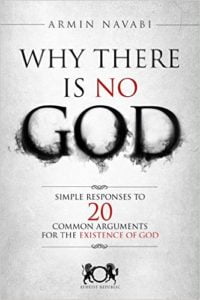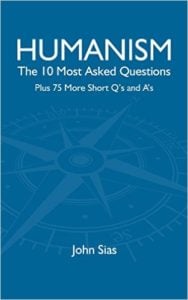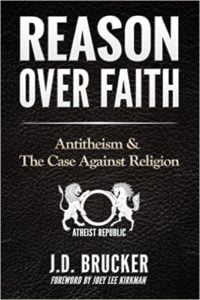
The recent news that the majority of Norwegians don't believe in god surprised many of our readers (especially in the USA), but it reflects a growing trend towards a secular, and even atheist society in Norway. The separation of church and state is ongoing, while membership in Human-Etisk Forbund (HEF – the Norwegian Humanist Association) continues to grow. While humanism and atheism are not the same thing, it is the HEF that are pressing most publicly for a secular society.
Humanism is a philosophical and ethical stance that emphasises the value of human beings, both individually and collectively. A person identifying as humanist will generally choose evidence-based facts and critical thinking (rationalism, empiricism) over acceptance of dogma or superstition.
I had the opportunity to speak with Even Gran, a journalist from the HEF member magazine Fri Tanke (Free Thought) and author of One Nation Under God, which examines secular America. A Norwegian language Kindle version is available from Amazon (US / UK) with an English translation available soon! Here's a summary of our conversation:
What is the latest on the separation of church and state?
The debate about separating the Church of Norway from the state actually began years ago. Although Parliament reached a conclusion in 2008, it took until 2012 for the process of separation to begin.
As a result of the initial changes, Norway now has no formal state religion, the government will not participate in the appointment of church deans and bishops, and there is no longer a requirement that at least half of the government ministers must belong to the Lutheran Church. From 1 January 2017, the Church is supposed to become a completely separate legal unit.
It is however important to note that the Constitution still establishes the Church of Norway (specified to be an evangelical-lutheran church) as “The People’s Church” (§16). It establishes Norway’s basis of values as stemming from “our Christian and Humanist heritance” (§2). The Constitution also still requires the King to swear allegiance to “God the all-knowing and almighty” when he is sworn into office (§9), and the King is also obliged to adhere to the evangelical-lutheran faith (§4). All of this was renewed and affirmed knowingly by the National Assembly in 2012, so we clearly don’t have a complete separation yet.
Anyway, it’s important for the Church to have the freedom to govern their own affairs and decide for themselves what they want to do. Of course, a lot of people within the Church would like it to stay as part of the state, but it’s fair to say the majority of the population agree that a state church in a pluralist society cannot stand.
It’s like a process of divorce. A lot of issues must be resolved, especially how the Church will be financed. These conversations are still ongoing.
The separation has been a long-standing goal of the HEF. What’s next?
We are of course in favour of a secular state, in which the state should take a neutral stance on religion. The state church of course contradicts this. Now we are working to maximise the separation, to ensure there is no “residue” leftover in state affairs, such as those paragraphs in the Constitution. We are actively working to make sure these are removed.
Does the HEF define itself as an atheist organisation?
Atheism by its definition means you do not believe in god. According to that definition, we are an atheist organisation. The term can be seen by many as anti-religious, but that’s not a goal of humanists. Humanism is about rejecting creationism and supernatural views of reality, but it’s about so much more than that.
We take a humanist view on reality, on morals, and on what a human being is. That means establishing the human being as the source of all knowledge and morals, and also as a goal in itself. We believe in science. Science is the finest work of the human being, and it offers the best tools we’ll probably ever get to unveil the truth about reality. When it comes to moral values we believe strongly in human rights, because humans across cultures, religions and borders have decided that these are our common values. A happy human life is the ultimate goal.
Why is there a growing trend of atheism in Norway?
I’m really not sure. I have some loose ideas but social scientists will know more about this than me. The way I see it, so many important scientific discoveries have been made over the past twenty years, and the internet has been an important development.
Previously, people were born into religions, but now there is greater access to information than ever before. People are asking questions and many have become more aware that they don’t actually believe in a god. Maybe people have become more aware of their own religious notions? Notions they previously just took for granted or just didn’t think so much about, now seem to have become a topic of discussion. That raises the awareness.
It also seems like religion has become more about whether you believe in a god or not. If you speak to a scholar of religion, they will tell you that religion is so much more than that.
How has increased immigration to Norway affected the work of HEF?
Historically state church and Christianity in Norway has almost exclusively dominated our debates. In recent years there’s been a lot of immigration from Muslim countries and some people think that we should stop talking so much about Christianity, because they see Islam as a threat to our liberal society. We take the view that society should accommodate different religious viewpoints, but we are of course critical of the intolerance and illiberal teachings of some strains of Islam. And of course we are strongly against islamic terrorism, or indeed any kind of terrorism and extremism. We defend a liberal, pluralist state and human rights for all.
Within our membership just like in the wider population, there is disagreement about whether you should criticise Islam and see it as a threat to Europe, or promote integration and dialogue with the aim of peaceful coexistence within a pluralist state . What we do is focus on the individual. We try to refrain from speaking in overly general terms about complex issues like Islam.
For example, we are critical of the Norwegian imam who recently showed support for the killer of a Pakistani governor, but we refrain from generalising his particular views to the whole of Islam. A lot of muslims disagree with him, and we see them as important allies in the fight for a secular, tolerant and pluralist state. If you speak in too general terms about Islam, in a condescending way, you risk alienating you potential allies. That is at least my concern.
Who should join HEF?
We are the place for everyone who has a humanist life stance. Perhaps our most important work are the ceremonies we host; confirmation (coming of age), weddings, births and funerals. It’s so important that people with a humanist life stance can have these ceremonies if they wish. Around 10.000 14-year-olds celebrate Humanist confirmation every year in Norway. This is our largest yearly achievement, and the place where most Norwegians get to know us.
You can find out more about the work of the Human-Etisk Forbund at human.no
Available on Kindle:
—
Photo: Marcus Böckmann





Hi, In you article you refer to Norway becoming an atheist society. I understand that many more people do not believe in God but I would disagree with your comment that Norway is becoming an atheist society. In my graduate research at the university in Oslo I focused on this. Many also had this same thought but research has proven that Norway and or Scandinavia is not becoming more atheist as you call it but more secular and pluralist. As was briefly mentioned in your article immigration plays a role in this. Imigration has grown more in recent years in Norway and crisis around the world has brought many refugees to Norway. Some things abouts Islam were mentioned in your article but surprisingly most of the immigrants coming to Europe have a Christian background. For example Polish people are mostly Catholic and they are one of the biggest immigrant groups in Norway. Numbers show that the Catholic church in Norway has grown tremendously in the last few years. Most immigrants hold on to their beliefs even though they come to live in Norway. And if you are talking about Norwegian society then you should include immigrants because they are an obvious part of society. So to say that Norway is becoming an atheist society I think is an understatement. Norway is becoming more multicultural and more pluralist.
Humanism = organized atheism.
There is a lot more to this than is seen on the surface. Take for instance the statement regarding teenage Baptisms, he said “This is our largest yearly achievement”. What exactly is being “achieved”? and why call it an “achievement” instead of a service.
Perhaps the satisfaction which comes from feeling that there are 10,000 kids who are being turned away from any potential belief in God, whom the HEF and others of their ilk, abhor with a vengeance.
Does it not strike anyone as being a little odd that atheists, who profess not to believe in God spend all the time and effort (which they do) in opposing Biblical Christianity, even to the lengths of offering “alternatives” for weddings and funerals etc.
We have people like Richard Dawkins who puts enormous effort into his opposition of Biblical Christianity amid what he and those like him see as a purposeless and meaningless existence.
With a little honest research one could be excused for thinking that these people are not fighting FOR truth, but rather doing all they can to suppress it; in order to try and justify their own rebellion, as it is always easier to justify rebellion when you can convince others to join you in the midst of it.
A fleeting glance over Christian content on the internet will always reveal scores of comments from those who hate even the idea of God and the moral accountability which accompanies said belief.
Humanistic pride wants to write it’s own rules, to try and silence the conscience (which science cannot explain) when the alternative would be to admit they are sinners in need of salvation.
I watched an interesting documentary, available in full on youtube called “Expelled: No Intelligence Allowed”. Ben Stein decided to investigate claims that academia was also doing it’s part to suppress anything to do with Biblical Christianity, even to the point of dismissing college professors for even entertaining the idea of intelligent design. The results he uncovered were indeed eye-opening and reaffirms what I said earlier about the suppression of truth.
Before God was thrown out of Schools, colleges and the workplace by “Humanists” kicking up a fuss, the world was a much better place, but when you tell people either directly or indirectly that their existence is merely an accident without purpose the results are in the news every single day.
As a correction to my post above I meant to say “Teenage confirmations”, not Baptisms.
With regard to humanist confirmation, you ask “What exactly is being achieved?” The answer is simple. It’s that non-believers are given and are accepting an alternative to a religious celebration of coming of age. There is nothing at all “odd” about atheists and/or humanists offering, seeking and enjoying “alternative” confirmations, weddings, and funerals. What makes you think that believers should be the only people who desire ceremonies to honour the milestones of our lives?
As for “kids who are being turned away from any potential belief in God.” Isn’t confimation supposed to be about people who are on the verge of adulthood making up their own minds? There are still far more teens forced into church confimation by their parents, in the name of tradition.
Your charge that Dawkins and other atheists see life “as purposeless and meaningless existence” is false and ignorant. On the contrary, atheists revel in and cherish this life more than believers do, because we believe it is the only one we get.
Academia is not suppressing Christianity in the study of history and literature. What is and must be challenged are the areas where science clearly trumps religion. And there are many of those.
You claim that “the world was a much better place” before humanism, as if there is a causal relation. Please explain more specifically, if you can.